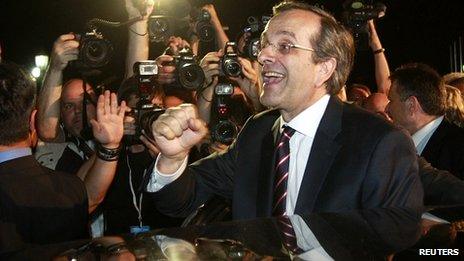Greece election: Temporary relief for eurozone
- Published
- comments

Antonis Samaras faces a new round of tough coalition negotiations
You could almost hear the sighs of relief coming out of Brussels and Berlin when the results from the Greek election were finally established.
One fact stood out above all others from a chaotic and confusing night: Greece, in the short term, would not be leaving the euro with all the chaos that would flow from it. Central bankers and European finance ministers, who had been on standby, could relax just a little.
Like so much in the eurozone, a step is taken that buys time but little more. The winner was Antonis Samaras, the leader of the conservative New Democracy party. He defined the election as a choice between staying in the euro or returning to the drachma. Despite that stark choice only 40% of voters backed parties that supported the bailout deal with the EU and the IMF.
The message from Greece was once more that they wanted to stay in the euro but not at the price of the austerity measures they were enduring.
The outcome does not offer stability to Greece. Waiting in the wings will be a new powerful opposition leader, Alexis Tsipras. This leftist radical got 27% of the vote by promising to tear up the bailout agreement, even whilst insisting he wanted to stay in the euro.
Shortly after the results Mr Samaras said he wanted to build a government of national unity. But Alexis Tsipras wanted nothing to do with it. His calculation is that this new coalition government will last just a few months. Last night he told his supporters: "very soon the left will be in power". And, for good measure, he repeated a message that found such resonance with the voters: "overthrowing the bailout was the only solution". He sounds like a politician not unhappy to be on the sidelines for a short period.
More hard bargaining
Mr Samaras's first priority will be to form a convincing coalition. He will get the support of Pasok, the Greek socialists. That coalition, in itself, brings with it problems. They are the two parties that have governed Greece for the past 30 years and are blamed for many of the country's problems.
Once he has formed a government his immediate challenge is the bailout agreement. Although he accepted the basic terms of the deal he insisted during the campaign that he wanted concessions. It should be remembered that when Pasok was in power he opposed many of the austerity measures, saying that what Greece needed was growth.
If he is confirmed in power he will have a stronger opposition breathing down his neck. He will say to Europe that he has anchored Greece in the eurozone and wants something in return. That will be difficult. Already the German Foreign Minister Guido Westerwelle has come out and said that the substance of the Greek reform (bailout) programme is non-negotiable.
Where there might be some flexibility is over the timing of the implementation of reforms. There may also be some movement over interest rates on the loans and the EU might offer Greece some funds to boost growth.
But the message is clear - the austerity programme with its budget and spending cuts will stay. The German finance minister underlined that message when he said "Greece's path will be neither short nor easy".
And therein lies the instability. The Greek economy is in freefall. The country is in the fifth year of recession. Unemployment is at 22%. Real wages - for many people - are down by 25%. The streets bear the scars of social breakdown. The country does not have much time.
What happens in Greece will be influenced by the outcome of the current tension between France and Germany.
Hollande growth agenda
The French President, Francois Hollande, will be emboldened by his victory in the French parliamentary elections. His Socialist party controls the Elysee Palace and parliament. The French view is that "Europeans need to help Greeks return to growth".
Mr Hollande will push hard for his growth first agenda. He wants more flexibility on meeting deficit targets. He wants a European banking union that contains a joint deposit guarantee scheme. He is pushing a 120bn-euro (£97bn; $152bn) growth covenant for Europe. Chancellor Merkel is cautious as usual. In recent days there have been several warnings from Berlin that Germany cannot take on all of Europe's debts.
And then it should not be forgotten - Greece had the ability to spark a severe crisis.
But the future of the eurozone will be determined by what happens in Italy and Spain. And here two fundamental questions remain unanswered. If those economies get into difficulty what will stand behind them, how will they be supported? And - perhaps most importantly - where will growth come from to relieve two countries mired in recession? Without those answers the can is still just being kicked down the road.